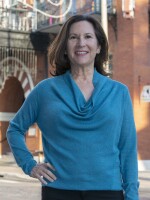Our nation's democratic elections are being threatened like never before. Florida Matters this week takes a look at how our ballots are being protected - both nationally and around the state. WUSF's Robin Sussingham talks with Brian Corley, supervisor of elections with Pasco County, and Miles Parks, a reporter with National Public Radio in Washington, D.C.
Parks said he's found that people are "really nervous" about what happened in 2016.
"Very rarely do I go up to somebody to do kind of a man on the street interview, if I'm reporting somewhere and say, you know, in some different language, can you kind of explain to me what you understand happened in 2016?" he said. "Very rarely do people have a complete view of it. Usually, it's something like, Oh, well, Russia hacked the election, or Russia was in favor of Trump and wanted him to win. And so they affected things. But in terms of the granular understanding, it's just very, very small."

Parks said it'll probably take a new election for people's minds to change on how secure the process is.
"There is a disconnect between people's understanding and reasoning and what's actually happening," he said, "because it's in arguable that the 2020 election is going to be, 'safer, more secure' than the 2016 election. But I don't know that that message has really gotten out to people. I think we need to have a successful run before people really see that things have improved. We need to have an election happen."
Corley agreed, saying he did see a lot of angry voters during the last presidential election.
"It was palatable," he said. "I go back to previous elections and you would see voters in line say early voting had a block party feel, and it didn't matter their political party or gender or race etcetera. They were committed to their civic duty in 2016 - voters were there for a purpose. And I'm optimistic because in 2018, it seemed to be a little bit of return of civility among the voters. And I'm optimistic that we'll see that in 2020."
Corley says Florida was fortunate in the the state moved away from touch-screen machines in the early 2000's and now relies on paper ballots. But he says "the threats are real, and they're evolving."
"And the bad guys and girls only have to be right one time, we have to be right 100 percent of time, and we're aware of that," he said. "So I think going into 2020 we've done a lot to upgrade our systems and shore up our networks."
But, he says a bigger concern is foreign meddling in social media surrounding elections.
"In 2016, that was the primary catalyst for meddling," Corley said. "The misuse and the hijacking of social media. And that's happening right now. And that's going to happen in 2020 and that's the real concern I have is the voters who are unknowingly aiding and abetting."

Parks said elections officials nationwide have learned a lot since the last election.
"I think there's there's no question that, from a technical standpoint, the U.S. is going to be in a much better place than we were in 2016," he said. "One of the things that you can look at is just the amount of voters who are going to be voting on systems that do not involve an auditable paper trail. That number has been slashed more than in half in 2020 versus 2016."








